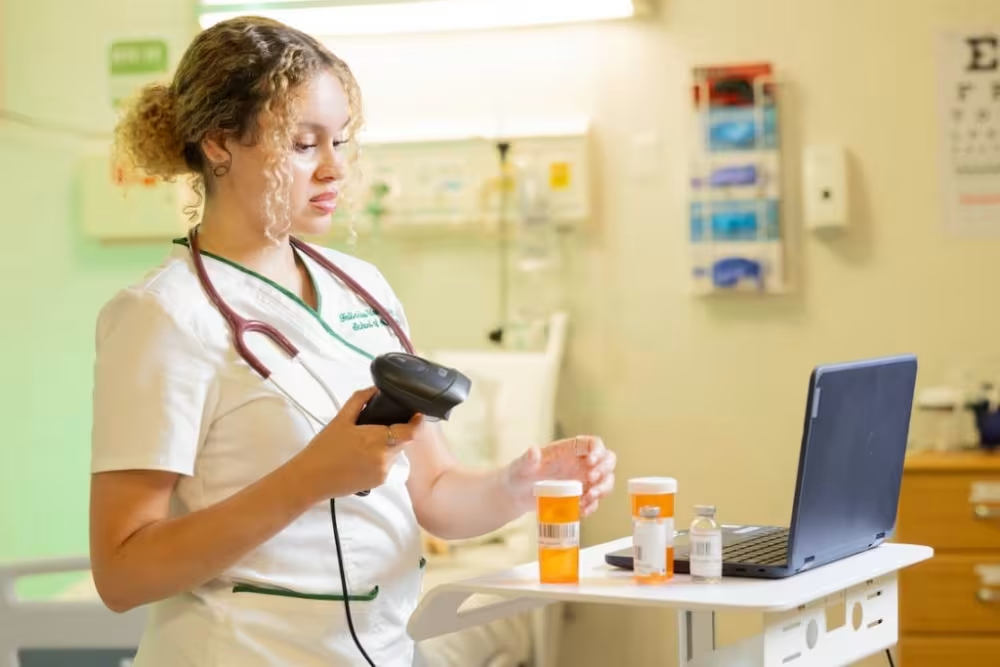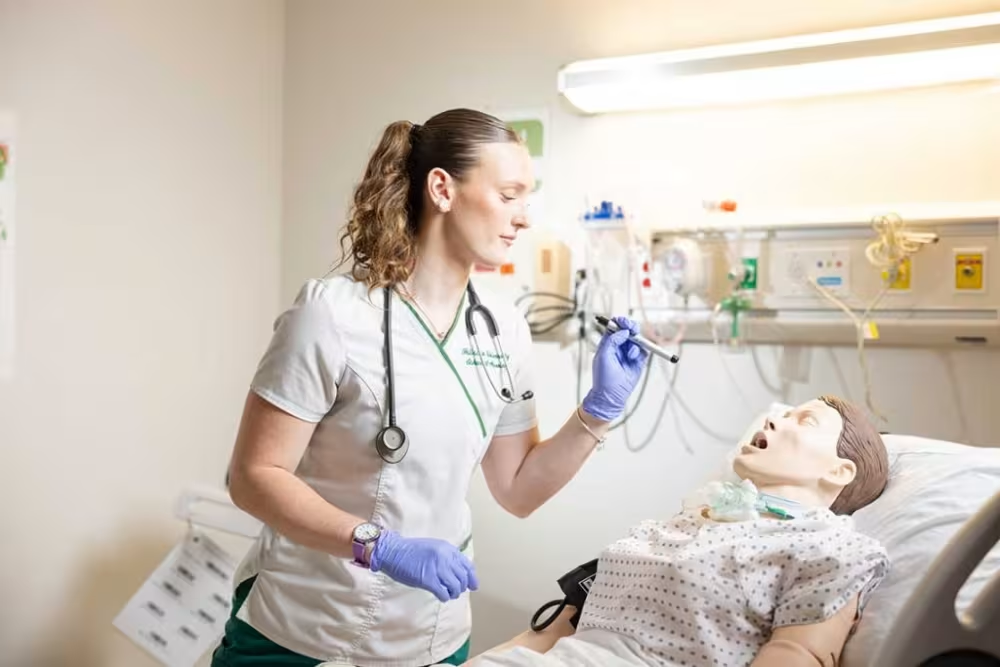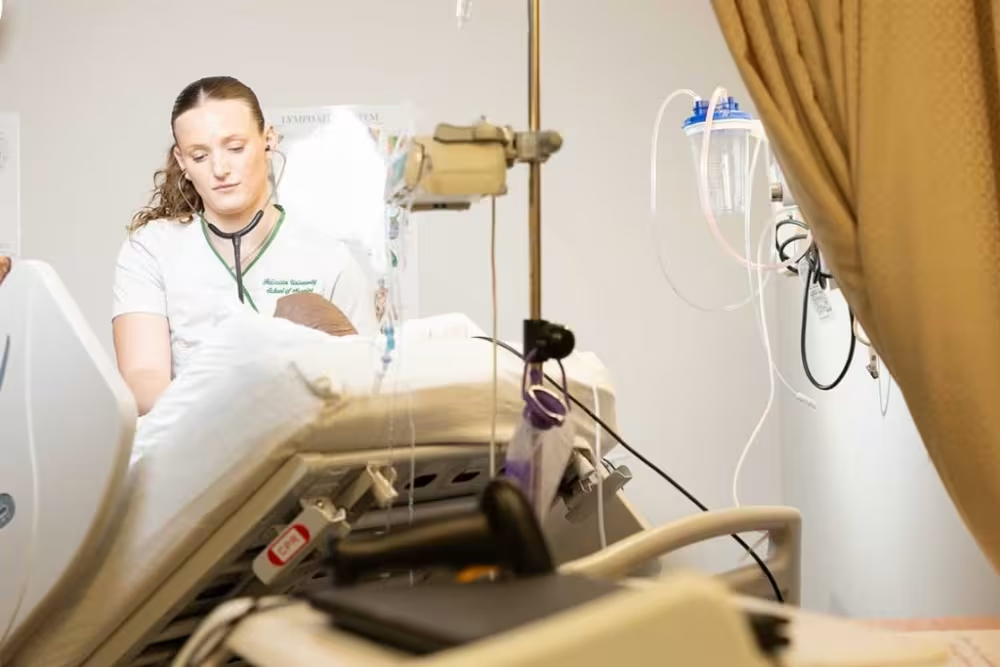What Do Nurses Do? Explore Nursing Duties and Specialties
Each blog post is dated and contains accurate information as of that date. Certain information may have changed since the blog post publication date. If you would like to confirm the current accuracy of blog information, please visit our ABSN overview page or contact admissions at (844) 347-2497.
What do nurses do? Nurses perform various care tasks as they help set patients on the road to recovery. Their day-to-day responsibilities typically include patient assessments, wound care, patient education, and administering medications; however, responsibilities can vary depending on nursing specialty and work environment.

What do nurses do? Nurses are healthcare professionals who provide life-saving patient care. Unlike physicians, they cannot diagnose or prescribe medications. Instead, nurses provide holistic care and carry out treatment plans determined by physicians, helping patients on the road to recovery.
There are many different types of nurses. At Felician University, the Accelerated Bachelor of Science in Nursing (ABSN) program enables students to earn a Bachelor of Science in Nursing (BSN) in as few as 16 months, preparing them to excel in their careers, regardless of specialty.
The program offers two course delivery options, so students can choose the type that best fits their needs. The Hybrid program in Parsippany, New Jersey, combines online learning with hands-on labs and clinicals. Online coursework allows students to complete assignments from home, provided they meet deadlines and attend in-person proctored exams.
Alternatively, students can opt for the entirely in-person On-Ground program at the main campus in Rutherford, New Jersey. Regardless of your chosen program, you will receive a comprehensive nursing education that gives you firsthand experience in what nurses do.

Ready to become a nurse? Learn how an ABSN program works and why it’s an excellent option for career changers.
Nurse Responsibilities
Nurses provide a wide variety of patient care. While they do not determine a patient’s treatment, they do possess some practice autonomy. For example, if a patient enters cardiac arrest, nurses can start performing CPR without being ordered to do so, while physicians determine the next best steps.
A nurse’s responsibilities vary each day and from patient to patient. Typically, their responsibilities include:
- Administering medications: Nurses administer prescribed medications at the correct dosage, recording the time and route.
- Advocating for patients: Nurses are often the voice for their patients, relaying their needs.
- Assessing patients: Nurses assess patients, take vitals, and record medical histories and symptoms.
- Educating patients: Nurses educate patients and their families in health conditions, at-home care, and more.
- Monitoring patients: Nurses monitor patients for any changes in condition and swiftly communicate concerns to physicians.
Where Do Nurses Work?
Over half of the nursing workforce can be found in general and surgical hospitals, but nurses can work in a wide variety of environments. Nurses are needed in many settings, from schools to long-term care facilities. While the nursing specialty will influence available working environments to an extent, the most common working environments include the following:
- Hospitals
- Nursing homes and other long-term care facilities
- Patients’ homes, as home health nurses
- Physician offices
- Schools and universities
- Urgent care and other clinics

Nurses work in many different industries, including:
- Ambulatory healthcare
- Government (the highest paying industry)
- Nursing and residential care facilities
- State, local, and private educational services
- State, local, and private hospitals
Types of Nurses
Nursing roles and responsibilities also vary by specialty. Nurses can specialize in medical conditions, healthcare environments, and patient populations. Below is a sample of different types of nurses and their responsibilities.
Emergency Room Nurse
What do nurses do in hospital emergency rooms? Emergency rooms are fast-paced environments where patients with traumatic or life-threatening injuries and conditions go for treatment. These types of nurses are focused on stabilizing patients with the end goal of discharge or transferring to a different unit for more specialized care. Their responsibilities include:
- Administering medication
- Providing wound care
- Assisting in setting broken bones
- Starting IV lines
- Triaging patients
Critical Care Nurse
Critical care nurses, sometimes called intensive care or ICU nurses, work with patients in critical condition in hospital ICUs. These are patients with severe conditions requiring round-the-clock care and monitoring.
A critical care nurse’s responsibilities include monitoring patients, administering medications, managing IV lines, and advocating for patients. Because critical care patients often have comorbidities, these nurses must pay close attention to details while administering medications and other treatments.

Oncology Nurse
These types of nurses care for patients diagnosed with cancer. They have the same responsibilities as other nurses, including monitoring patients, maintaining patient records, and administering medications.
Oncology nurses must be highly compassionate, strong communicators, and have a caring bedside manner. They must help coordinate care between teams while comforting patients and their families. Nurses who enjoy forming relationships with their patients might excel as oncology nurses.
Pediatric Nurse
Pediatric nurses care for children from infancy to adulthood. Children’s physical needs and milestones vary significantly throughout childhood, which is why they require specialized nursing care. These types of nurses must be empathetic, compassionate, and highly skilled communicators to connect with children of all ages. Several subspecialties exist within pediatric nursing, including oncology and critical care.
Specific responsibilities will vary by subspecialty and work environment. For example, pediatric nurses in physician offices are not required to provide the same level of patient monitoring as critical care nurses in the pediatric ICU. Despite variations, pediatric nurse responsibilities include patient and caregiver education, patient assessment, medication administration, and collection of patient vitals.
Learn how you can become a pediatric nurse.

Neonatal Nurse
Neonatal nurses work specifically with newborn infants. Sometimes referred to as NICU nurses, their patients range from healthy newborns to infants born with complications. These infants are placed in the neonatal ICU, where they receive round-the-clock care from neonatal nurses and physicians.
Their responsibilities are unique, as infants require specialized care. A typical shift can consist of:
- Administering medications
- Caring for infants, such as feeding, bathing, and changing diapers
- Monitoring patients
- Offering emotional support to parents
- Providing education to caregivers
Medical-Surgical Nurse
Medical-surgical nurses, often called med-surg nurses, work in post-surgical environments, caring for patients recovering from surgical procedures. What does a nurse do in these environments?
Med-surg nursing is very similar to other nursing specialties; however, because their patients are either preparing for or recovering from surgery, their responsibilities typically revolve around infection prevention and patient safety. They will also perform specific tasks more often than other nurses, such as wound care.

Advanced Practice Registered Nurse (APRN)
APRNs have undergone additional training to earn a graduate degree and board certification in their specialty. These are specialized healthcare providers with a greater scope of practice than registered nurses. Types of APRNs include:
- Nurse Practitioner (NP): NPs can specialize in family nursing, adult-gerontology, pediatrics, and more. They are clinical professionals who can diagnose, treat, and, depending on the state, prescribe medications without physician oversight.
- Certified Nurse Midwife (CNM): CNMs care for women throughout all stages of pregnancy, childbirth, and the postpartum period.
- Clinical Nurse Specialist (CNS): Like an NP, a CNS can diagnose, prescribe medications, and treat patients; however, their focus is primarily on advancing the nursing practice and patient care. This is done through advocacy, evidence-based research, and interdisciplinary collaboration.
- Certified Registered Nurse Anesthetist (CRNA): CRNAs are specialized professionals who administer anesthesia and other medications.
APRNs have a higher earning potential than registered nurses because of their specialized skill sets and advanced training. While nurses made a median annual salary of $93,600 in 2024, the APRN median annual salary was $132,050.
Start Your Nursing Journey Today
If you have a non-nursing bachelor’s degree or at least 60 college credits, the hybrid and on-ground ABSN programs at Felician University can provide you with the firsthand experience needed to answer the question, “What do nurses do?”
Nursing coursework introduces you to nursing practice and theory, so you can develop skills and clinical judgment in nursing labs. Lastly, clinical rotations allow you to experience what it’s like to work as a nurse in multiple nursing specialties at local healthcare facilities.
Take the first step toward becoming a nurse today. Contact an admissions counselor to learn how the ABSN program prepares you to become a nurse in any specialty.
